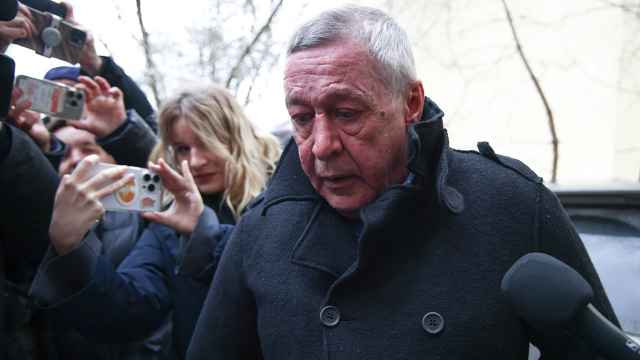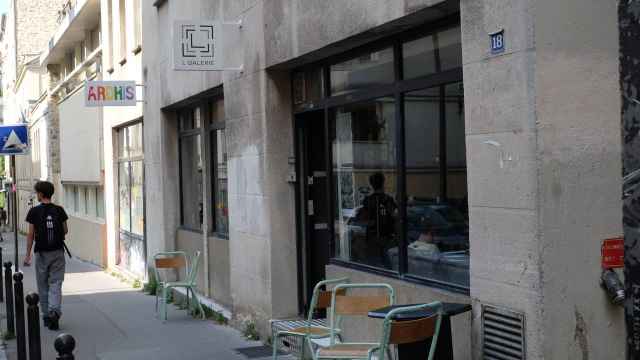It may not be the end of the Russian theater world as we know it, but the pages of history have been turning furiously of late.
I intended to write this piece two weeks ago, but I held off to see how a few things might develop. In the meantime even more has happened, while some events I thought would shake down are still in flux.
In the most positive and constructive of all the events, Andrei Moguchy, the unique and talented director from St. Petersburg, was named the artistic director of St. Petersburg's Bolshoi Drama Theater on Friday. One of the Soviet Union's most important houses from the 1960s to the 1980s, in large part because of the extraordinary leadership of Georgy Tovstonogov, the theater has hung in limbo ever since Tovstonogov's death in 1989.
In recent years BDT, as the theater is known popularly, was run by Temur Chkheidze, an accomplished and respected director with roots, like Tovstonogov, in Georgia. Chkheidze had success from time to time at BDT, but there was always a sense that the theater's reputation was in constant and irreversible decline. Chkhedize himself recognized that and resigned his position, reportedly declaring that a younger, bolder artist would be required to take the theater into the future.
At the age of 51, Moguchy may or may not be classified as young, depending upon one's point of view. But no one will challenge his status as one of Russia's boldest, most unusual makers of theater.
In works at various St. Petersburg venues, such as his own Formal Theater, the Circus on Fontanka, the AKhE theater of engineering, the Alexandrinsky Theater, the Baltic House, and the Mariinsky, as well as work abroad in Poland, Germany and France, Moguchy has repeatedly surprised and challenged audiences and performers alike. His style of highly visual shows set in complex, often grandiose physical settings, has won him awards and fans for the better part of two decades.
Moguchy takes over BDT just as it is preparing to reenter the newly refurbished old building at 65 Fontanka.
On a completely different note the Russian theater community was shocked when news broke late Thursday evening that the Russian Academy of Theater Arts, often still known by its Soviet acronym of GITIS, was on fire. Photos, memories and expressions of despair and anger were shared fast and furiously on Facebook, even as firemen attempted to douse the inferno.
The fire enveloped an area of 500 square meters, causing serious damage to the building's roof, a storage area for sets and costumes, the student theater stage, some of the halls used for directing students, and the institute's library. No one was injured.
It is too early to say exactly what effect the fire will have on life at the theater institute. For the time being halls and classrooms used by the directing and acting departments will be closed. The official reason given for the fire is an electrical short.
Moscow, however, is a city famous for fires set by arsonists for commercial reasons. In the past, at least, it was a method used to remove organizations with no commercial value from property having high commercial potential. One of the most famous incidents of this type was the 1990 fire that pushed the historic Actors House out of its longtime home on Pushkin Square in order to make way for a shopping center. Not surprisingly, talk has begun as to why fire came to GITIS.
While I caution reading too much into this version at this point, it is a topic that cannot be avoided. Afisha magazine openly referenced this tradition by following up the GITIS story with a list entitled "" of other famous theater-related fires. The for Vesti, the Russian TV news program, quoted an unnamed GITIS student as saying, "Conversations already arose in our first year of study that someone wanted to take away the GITIS building to open a bank or something else. The location is too convenient and too respectable: the center of Moscow, 15 minutes from the Kremlin, five minutes from the old and new Arbat."
An even more provocative statement comes by way of Igor Ovchinnikov, an instructor at GITIS. In a Facebook text titled "A Few Rapid-Fire Facts for Thought," he points out that the building was effectively evacuated exactly one hour before the fire broke out. It didn't matter whether students had a scene to show or an exam to take, Ovchinnikov wrote, "everyone was chased out at 10 p.m…. The fire began at 11 p.m."
On Saturday morning news came that Valery Zolotukhin, the longtime actor at the Taganka Theater and its artistic director since Yury Lyubimov resigned the post following a scandalous falling-out with the company in 2011, had died at the age of 71. It was not unexpected news, since it was common knowledge that Zolotukhin was in a coma in a Moscow hospital. But it is hard not to see a grim coincidence in the timing of the event, for on Friday Lyubimov met with Moscow authorities to discuss the possibility of his returning to his old job.
The future of the Taganka has been a topic of conversation for some time, ever since Zolotukhin in early March announced his resignation as the theater's head for health reasons. Numerous names of potential replacements were tossed about in the press, including Konstantin Bogomolov, Alexander Ogaryov and Vladimir Mirzoyev.
More or less at the same time, Lyubimov thrust himself into the conversation by threatening to demand the closing of all productions at the Taganka staged to his scripts. Had his demand been carried out the Taganka would have lost 17 productions in one fell swoop, including such historical works as "The Master and Margarita," scripted by Lyubimov from Mikhail Bulgakov's popular novel.
In a matter of days Lyubimov's demands were being met with calls to return him to his position of artistic director at the Taganka. This was even supported by a group of actors within the theater.
On Friday the Moscow culture czar Sergei Kapkov visited Lyubimov's Moscow apartment for discussions. According to a in Novaya Gazeta, Lyubimov is still angry about the 2011 conflict with the Taganka troupe and has no wish to take up his old job. He did, however, leave the door open for future negotiations — the Taganka is set to celebrate its 50th anniversary in April 2014, and Lyubimov did not decline to be a part of that event.
Another theater facing down troubles these days is the brash young ON.TEATR in St. Petersburg. Since it was founded by Milena Avimskaya in 2009, it has breathed new life into the theater world in Russia's so-called Northern Capitol. Not only has it championed the works of new writers, it helped to develop numerous new directors, some of whom have gone on to gain national recognition.
However, the basement space at 18 Ulitsa Zhukovskogo that the theater took charge of in 2011 has proved to be something of a problem. Neighbors above the theater lodged numerous complaints about noise, and those complaints were followed by visits from various municipal safety inspectors.
In a series of court dates over the last week ON.TEATR was ordered to shut down activities until such time as it satisfactorily corrects safety violations and has a new noise reduction system put into place. According to a report on the of Fontanka.ru, a judge on Thursday ordered the theater to pay a fine of 20,000 rubles ($644).
The good news for ON.TEATR is that it would appear that there will be no official attempt to close the theater down. However, Avimskaya admitted that there are limits to correcting the space now occupied by ON.TEATR, and she declared she will appeal to the governor to help the theater find a new home.
A Message from The Moscow Times:
Dear readers,
We are facing unprecedented challenges. Russia's Prosecutor General's Office has designated The Moscow Times as an "undesirable" organization, criminalizing our work and putting our staff at risk of prosecution. This follows our earlier unjust labeling as a "foreign agent."
These actions are direct attempts to silence independent journalism in Russia. The authorities claim our work "discredits the decisions of the Russian leadership." We see things differently: we strive to provide accurate, unbiased reporting on Russia.
We, the journalists of The Moscow Times, refuse to be silenced. But to continue our work, we need your help.
Your support, no matter how small, makes a world of difference. If you can, please support us monthly starting from just $2. It's quick to set up, and every contribution makes a significant impact.
By supporting The Moscow Times, you're defending open, independent journalism in the face of repression. Thank you for standing with us.
Remind me later.






